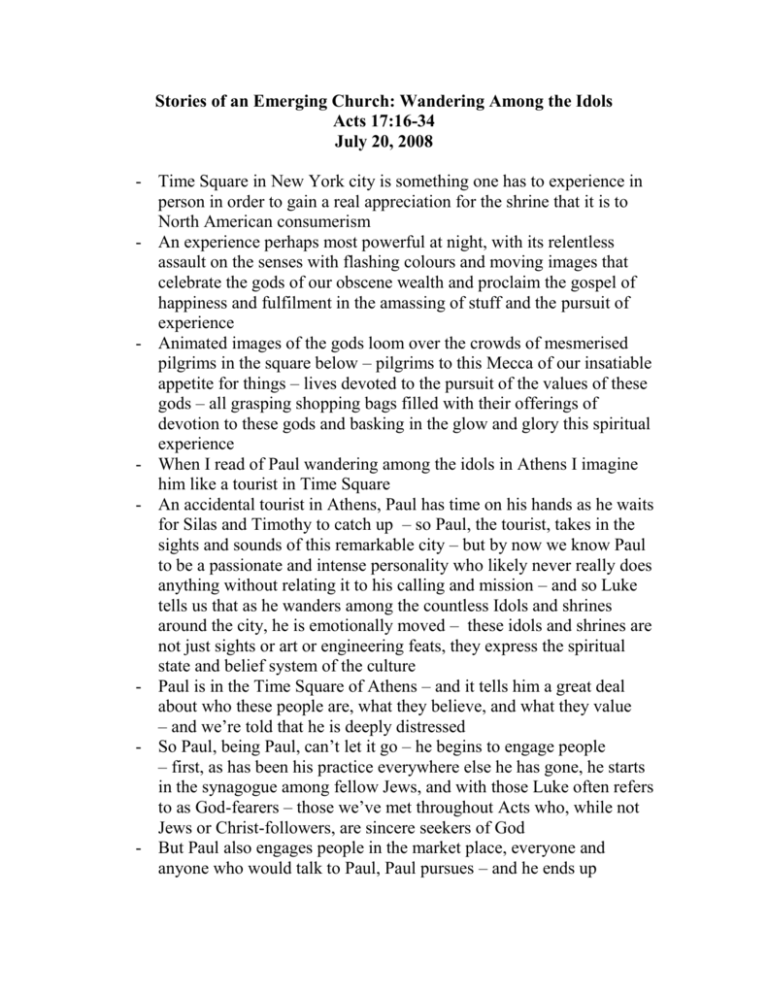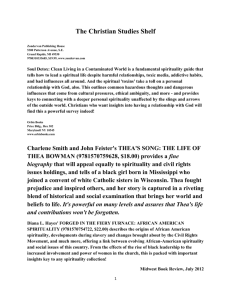Sermon Text
advertisement

Stories of an Emerging Church: Wandering Among the Idols Acts 17:16-34 July 20, 2008 - Time Square in New York city is something one has to experience in person in order to gain a real appreciation for the shrine that it is to North American consumerism - An experience perhaps most powerful at night, with its relentless assault on the senses with flashing colours and moving images that celebrate the gods of our obscene wealth and proclaim the gospel of happiness and fulfilment in the amassing of stuff and the pursuit of experience - Animated images of the gods loom over the crowds of mesmerised pilgrims in the square below – pilgrims to this Mecca of our insatiable appetite for things – lives devoted to the pursuit of the values of these gods – all grasping shopping bags filled with their offerings of devotion to these gods and basking in the glow and glory this spiritual experience - When I read of Paul wandering among the idols in Athens I imagine him like a tourist in Time Square - An accidental tourist in Athens, Paul has time on his hands as he waits for Silas and Timothy to catch up – so Paul, the tourist, takes in the sights and sounds of this remarkable city – but by now we know Paul to be a passionate and intense personality who likely never really does anything without relating it to his calling and mission – and so Luke tells us that as he wanders among the countless Idols and shrines around the city, he is emotionally moved – these idols and shrines are not just sights or art or engineering feats, they express the spiritual state and belief system of the culture - Paul is in the Time Square of Athens – and it tells him a great deal about who these people are, what they believe, and what they value – and we’re told that he is deeply distressed - So Paul, being Paul, can’t let it go – he begins to engage people – first, as has been his practice everywhere else he has gone, he starts in the synagogue among fellow Jews, and with those Luke often refers to as God-fearers – those we’ve met throughout Acts who, while not Jews or Christ-followers, are sincere seekers of God - But Paul also engages people in the market place, everyone and anyone who would talk to Paul, Paul pursues – and he ends up engaging what are identified as Epicurean and Stoic philosophers who debate or argue with him in the city market – common gathering place - Who were these Epicurean and Stoic philosophers and why does Luke mention them specifically – well they are significant to understanding what Paul is dealing with in Athens – by the 1st century in Greece, philosophy held much more influence than spirituality – and Epicureanism and Stoicism were particularly influential – both of these philosophies were rooted in a materialistic world view that was very sceptical about the supernatural (anything beyond the material world) – both philosophies sought the pursuit of happiness and personal fulfilment through knowledge and living modest lives – the Stoics sought to live their lives in harmony with nature - We’re told that some of these philosophers who engaged Paul were sceptical, but others seemed interested and invited Paul to the Areopagus – the Areopagus was the Hill of Ares northwest of the Acropolis and it functioned as a court – their mythology claimed that the gods held the trial of Ares there for the murder of Poseidon’s son – during the Roman empire, this location was known as Mars Hill – it doesn’t appear that Paul is technically on trial here, but philosophically he is on trial – Luke’s 1st century readers we catch that point - The culture of Athens in which Paul found himself was not all that different from our North American culture – as Paul wandered wideeyed among the idols of Athens, but we might just as well imagine him wandering spell-bound in Time Square – the images assaulting his senses speak to a world view rooted in materialism but they also betray a desperate spiritual hunger – these shrines stand as a testimony to their technological knowledge and artistic expression, but they reveal the restless search for meaning and fulfilment - It’s clear that we could go two ways in looking for a lesson that applies to us out of this story– the issue of idols and false gods raises not only the realities of what it means for us to live in a pluralistic culture, it calls us to take stock of the state of our own loyalty to God - our first inclination may be to identify with Paul as those who possess the truth and who worship the one and only God in a world of idol worshipers – but it would be a shame to fail to take this opportunity to wander among the idols of our own lives – to be honest about the fact that we are all prone to the sin of idolatry – and it’s not just in the form of worshiping things other than God, it sometimes comes in the form of re-making God as we would prefer God to be – it comes often in the form of pursuing the religious or spiritual experience rather than God – it comes in the temptation to manipulate God into doing what we want rather than living our lives in pursuit of doing what God wants – our idolatry is expressed sometimes in the way we use circumstances to justify the choices we’ve already made by claiming they are the confirmation that we are following God’s will – and at times we are more interested in the pursuit of the knowledge of God, than we are in the pursuit of God - the scripture repeatedly warns us that to worship anyone or anything other than the true living God, is idolatry – so we have to occasionally wander though the idols we have allowed to take a prominent place in our lives, and remove them – even the idols we carry with us into church - but today, I want to focus on the lesson that this story of the emerging 1st century church that is seeking to engage its culture, holds for us as an emerging 21st century church seeking to engage our culture - Paul provides us with a example worth considering and profoundly relevant for us today - first, Paul affirms and identifies with the spirituality of the people of Athens – Paul could have immediately attacked their practices – the worship of idols was just about the most offensive thing a devout Jew like Paul could ever consider – but Paul recognizes what the presence of all these idols really says about these people – that it says something positive – that in fact, it says something about these people with which Paul can identify - so the first words that come out of his mouth are these, “I see how extremely religious you are in every way” – what the idols and shrines tell Paul about these people first and foremost is that they, like him, are people in pursuit of spiritual fulfilment – that they, like him are religious people who believe in something and someone beyond them - in fact, Paul goes on to compliment them on how sincere they have been in this pursuit – “As I wandered through your city and looked carefully at the objects of your worship, I saw an altar with this inscription, ‘to an unknown god.’” – the Greeks, like the Romans, had many gods – the god’s as they understood them were not necessarily good and benevolent gods who had the best interests of humans in mind - so by building statues and shrines to them, they hoped to honour them and keep them happy – it’s obvious that the altar to the unknown God is an attempt to cover all the bases – just in case we missed one, just in case there are gods out there that we don’t know of, we’ll honour them as well – it is a spiritual practice rooted in fear and superstition - but notice how Paul, identifies with these people – he sees them for who they are, religious people whose desire it is to get it right, to pursue a knowledge of God - but look at what he does second, - he uses their own understanding and interest in spiritual things to introduce something they do not yet know – verse 23, “For as I wandered through your city and looked carefully at your objects of worship, I even saw an altar with the inscription, ‘to an unknown god’. What therefore you worship as unknown, this I proclaim to you. The God who made the world and everything in it, he who is Lord of heaven and earth, does not live in shrines made by human hands…” - Paul gently pushes open a door they, themselves, have left ajar – a recognition that there may be a god they don’t yet know – and he suggests to them that they are right, that God has indeed revealed himself and that God wants to be found, adding that, “God is not far from each one of us” – that God is close – in fact, he quotes their own poets, “For we too are God’s offspring” as supporting this very idea - If we are God’s offspring, as their own poets and philosophers suggest, then, Paul asserts, the deity must not made of gold or sliver or stone, the deity is not formed by art and the imagination of mortals - Paul calls them to a new way of thinking that would represent a complete about-face in their thinking about God – that God, rather than made in our image, made us, and is making us in his own image - Imagine Paul today, as he did in Athens, wandering through Time Square – what would he know about our culture from the shrines and icons that compete for his attention – imagine him engaging the people around him, the venders and shop owners – while he probably wouldn’t say, “I see that in every way you are religious people,” – for one thing, religion has a bad name – no body, even church going religious people, want to admit they’re religious – but he may well say, I see that in everyway you are sincerely spiritual people - But what does it mean to be spiritual? – the Greek philosopher Plato, claimed that “we are fired into life with a madness that comes from the gods and which would have us believe that we can have great love, perpetuate our own seed, and contemplate the divine” – in other words we are created with a restlessness, a drive and an obsession to find meaning and fulfilment – Augustine would later say, we are by nature restless and cannot find rest until we rest in God - Ronald Rolheiser, a Canadian priest and author on spirituality says that when it comes to understanding spirituality “everyone is ultimately taking about the same thing – an unquenchable fire, a restlessness, a longing a disquiet, a hunger, a loneliness…that lies at the centre of human experience and is the ultimate force that drives everything else.” – “Spirituality,” he says, “is about what we do with that desire. What we do with our longings. Everyone has to have a spirituality and everyone does have one, either a life-giving one or a destructive one.” - That’s what Paul observed in Athens – that’s what Time Square reveals, that we are a culture with a spiritual longing – engaged in a restless pursuit of fulfilment and meaning – sometimes in the empty promise of the pursuit of material things – but often, disillusioned by the emptiness of the pursuit of the material and thus many restlessly search for something more - the common ground we have with our neighbours is that they, like us, are spiritual people, seekers of a meaningful relationship with God – they bear the same image of God, that drives everyone to pursue something more – to chase after the fulfilment of the image of God we are created to be and to become – that’s to be respected - I have discovered that many people will talk quite openly and very comfortably about their spirituality – and I have discovered that there is much common ground to be explored - people may be resistant to church and to religion but, as we know, most have a sense that they are spiritual and many actively pursue a for of spirituality and the practice of their spirituality - can we talk initially about our faith, in terms of our spirituality without pushing doctrine? – can we find the common ground and take a genuine interest in our neighbour’s spiritual life? – can we establish a relationship with our neighbour based on our common spirituality, our common pursuit of a knowledge and relationship with God? – and can we do all that with the hope that in time, as Peter puts it, we will be have the opportunity to give the reason for the hope that we have – and when we do, will we do it as Peter says, with gentleness and respect







